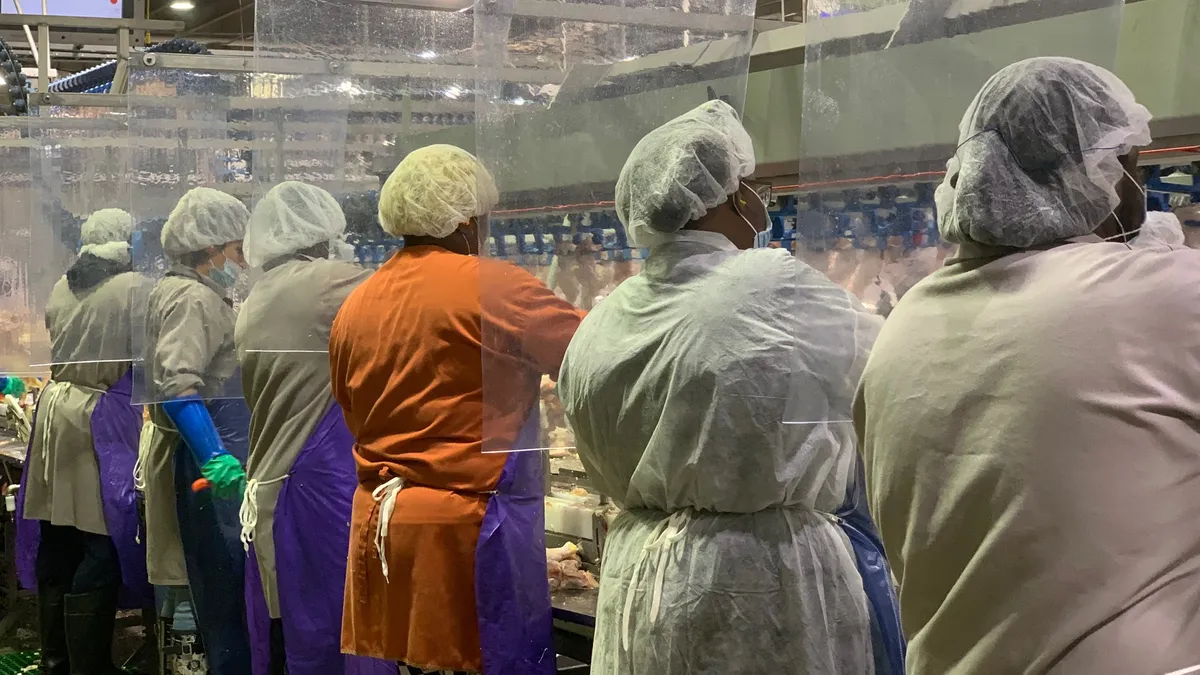Dive Brief:
- Tyson Foods announced it is piloting seven medical clinics near its meat plants to help boost the health of its workers at a time when its workforce has been severely impacted by the coronavirus. Tyson plans to start opening clinics in the first half of 2021.
- The meat giant is partnering with Marathon Health to operate the health centers, which will provide primary and preventive care.
- One clinic will be located in Storm Lake, Iowa, where Tyson has more than 3,300 workers at two plants. Another clinic will be at the company's Holcomb, Kansas, plant, which employs more than 3,000. The other clinic locations haven't yet been disclosed.
Dive Insight:
The coronavirus pandemic has highlighted the meat industry's weaknesses when it comes to worker safety. In an effort to change that, Tyson is investing more in protecting employee health.
In July, Tyson said it was starting a new monitoring program at its production facilities, where it is testing its workers weekly for the coronavirus, as well as creating a chief medical officer position and adding nearly 200 nurses and administrative support personnel. The company also revealed in its most recent quarterly earnings that it spent $340 million on safety measures and plant sanitation, which hurt its results.
Despite taking precautions — such as implementing barriers between employees, providing protective gear and giving temperature checks — the coronavirus has continued to spread in plants.
Early on in the pandemic, meat plants rapidly evolved into coronavirus hot spots, largely because workers stand shoulder-to-shoulder processing the food. So far, more than 40,000 meatpacking workers have tested positive, including more than 10,000 from Tyson, and at least 200 have died across the industry, according to the Food and Environment Reporting Network. Several families of workers who died from the coronavirus are suing Tyson.
Tyson, which produces roughly 20% of all beef, pork and chicken in the country, said these seven pilot clinics will serve almost 38,000 Tyson team members and their families.
"Some of our frontline team members aren't using their health plan benefits, and others don’t seek care until there’s a crisis," Johanna Söderström, executive vice president and chief human resources officer for Tyson, said in the release. "We want to change that by providing access to care that can help detect health conditions early and promote healthy habits."
Tyson is not the first company to make this move. Large companies have increasingly put clinics close to or at their facilities. Reportedly, this can help reduce costs by implementing more preventive health measures, having workers avoid pricey doctors and hospitals, and decreasing absenteeism as workers no longer need to take a lot of time off to see physicians. A Mercer employer survey found that one third of companies with more than 5,000 workers have clinics at their workplaces.
Mark Lauritsen, director of the United Food and Commercial Workers International Union's food processing and meatpacking division, told The Washington Post that other meat giants like JBS and Cargill already have some clinics at their bigger facilities.















